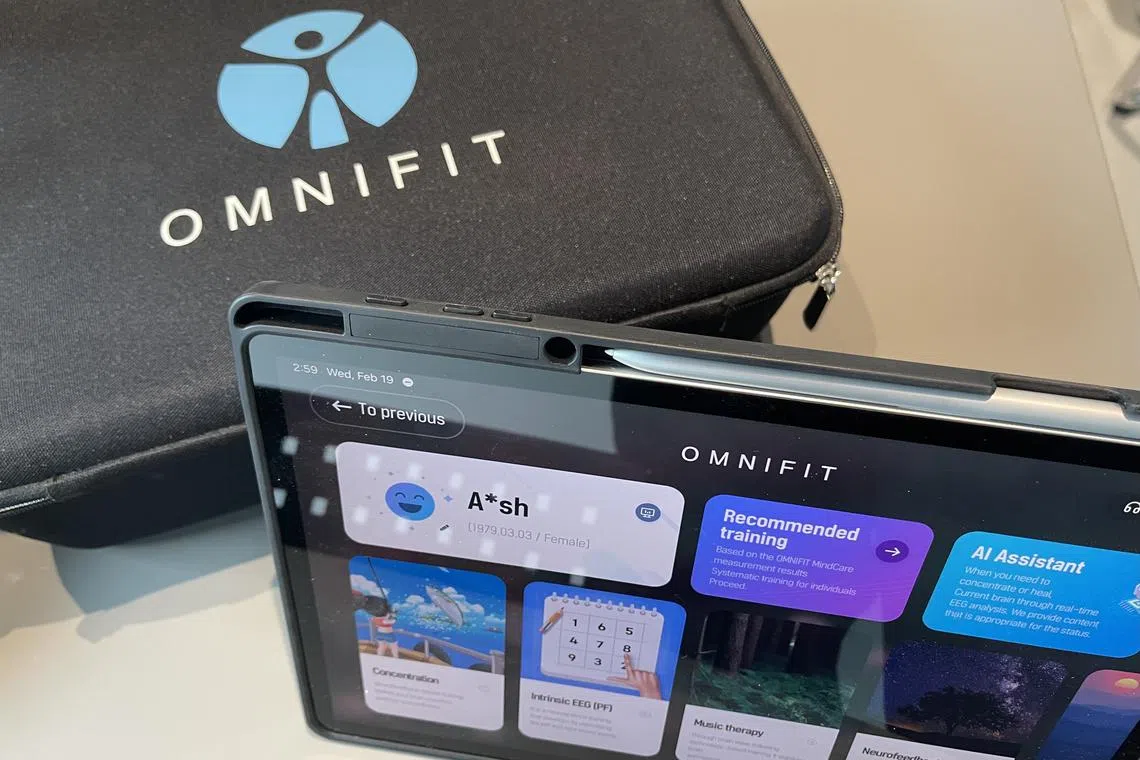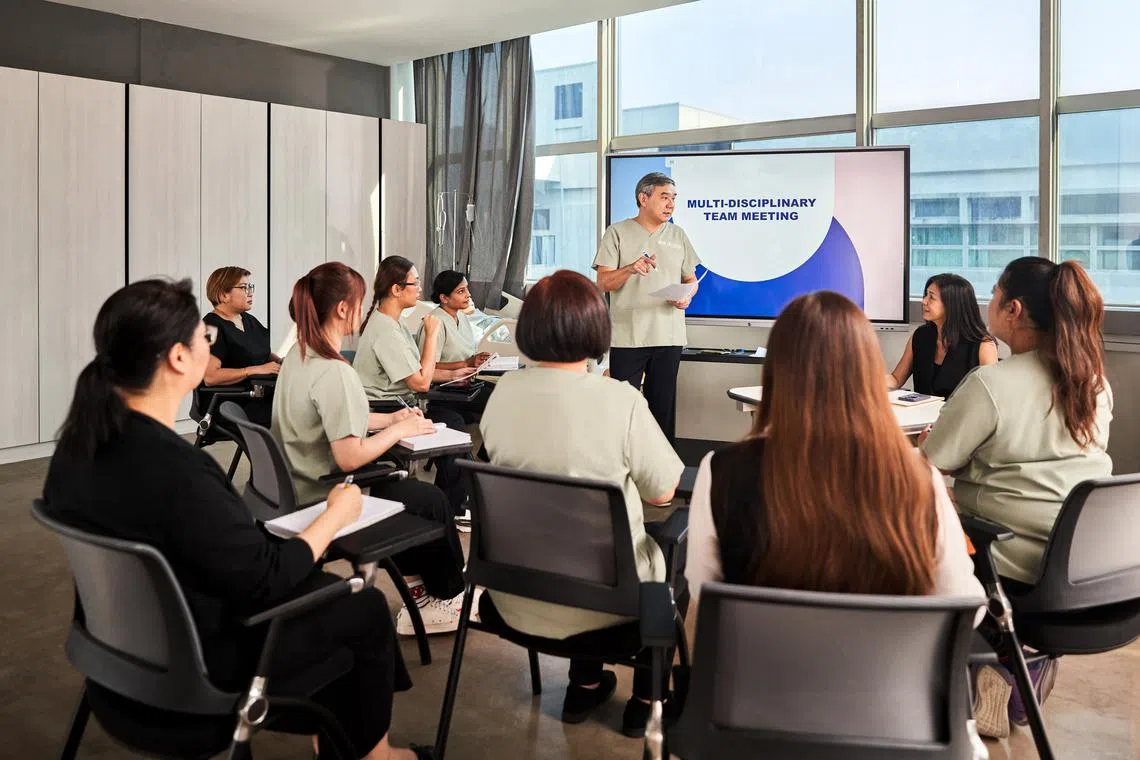iKare provides personalised care to improve mental well-being via Omnifit tech, one-to-one services
These are part of its Spark Plus programme, which focuses on helping seniors with their cognitive and physical abilities
[SINGAPORE] Home-care provider iKare’s Omnifit technology can analyse a person’s physical and mental conditions in a matter of minutes.
Once someone wears the lightweight headset and syncs it with the corresponding app on a tablet, the software first shows results related to the person’s physical traits, such as body mass index (BMI), and then overall stress levels.
What appears on the screen are the stress, lethargy and burnout indices. These can either be in green or red, depending on the user’s psychological state. Each index is accompanied by a number out of 100, with 100 signifying the highest level. There is also a stress-resistance indicator that shows how the user copes with mental pressure.
This assessment is done during the first session of iKare’s Spark Plus programme, which aims to improve mental well-being and reduce cognitive decline and primarily targets seniors.
Lee Sangchul, chief operating officer (COO) of iKare, said: “Our therapy programme helps people with their cognitive and physical abilities, and helps them prevent frailty. If they’re already experiencing cognitive decline, we can help them slow down the progression of the decline.”
This is especially in light of Singapore’s ageing population – by 2030, the government projects that nearly a quarter of the population will be aged 65 or above.
Navigate Asia in
a new global order
Get the insights delivered to your inbox.
Each programme runs for eight sessions. Clients can choose to renew afterwards – and a majority of them do so.
Lee said the assessment and stress test provide “more objective” data on each patient’s condition.
iKare’s team also asks the clients about their likes, dislikes and preferences to more effectively tailor a unique programme for them. This provides a personalised experience for each client.
He added: “Based on the test results (and interview), the algorithm will recommend a brain-training programme, which involves types of games where you train your ability to focus and concentrate. (For example), there are meditation and sound therapy activities that help you regulate your mood better. Doing these can improve overall wellness, especially emotionally.”
Other activities in the programme include brain games that reduce stress, and physical exercises.

Every session runs for an hour, and iKare recommends that clients take part in two sessions a week. Each patient has a dedicated therapist, to ensure that they are familiar and comfortable throughout the programme.
The COO said: “The biggest benefit of the one-to-one aspect is that we can pay full attention to that person every session, and we can adjust our programme just for that person.” This is different from mental-wellness programmes at community centres or active ageing centres, which conduct similar activities but cater to a larger group of people.
“If it was a group session, it’s more challenging to change the programme just for one person, because it might not be suitable for other people… A differentiating factor (from group programmes at centres) is that we visit homes and it’s one on one,” he added.
Every week, the therapist as well as iKare’s medical director, nurses, care coordinators and operations staff convene a meeting to discuss each patient’s condition and progress.
Lee said: “They have a discussion, share solutions and brainstorm different ideas. If there is a need, we will adjust the programme in real time... to make sure it’s the best fit for them.”

“Positive stimulation”
The Spark Plus programme and Omnifit tech primarily serve higher-income households – a segment that lacks premium services, said Lee. Each programme costs nearly S$1,400.
There has been a shift from intervention to preventive care, he highlighted.
He noted: “Before, (what we observed) is the government focusing on how to care for people who are already in need of care – (an) intervention, after the decline in health has already happened. But I think the government is now focusing more on preventing people from becoming ill.”
There was previously a lot of emphasis on improving patients’ physical condition, but mental health is “equally important to maintaining quality of life”.
Lee has seen clients with dementia or mild depression improve with iKare’s programme. “Just those two hours per week with their therapist and engaging with someone outside their family is a positive stimulation for them, which helps them recover from mild depression symptoms. In that sense, it is helpful for mental health.”
Providing home-based care also helps iKare serve a greater variety of clients.
“The moment you go to a hospital, you already have a diagnosis or issues you want to fix. Our services can definitely be used by people with those needs, but it can also be used by people who are relatively well,” he added.
Meanwhile, the Omnifit tech – which is certified by South Korea’s Ministry of Food and Drug Safety – is also used in fire stations and military bases in the East Asian nation, where personnel go to a separate room on their premises to relax and recover.
Currently, iKare is the only company in Singapore using the Omnifit tech.
Lee said iKare is “always looking for new things” to add to its services – be they devices or software.
Besides serving clients, he hopes to also address the issue of caregiver burnout. “The pressure and weight of providing care is really high. We want to create a service where we can care for the family members. So when a family hires us, it’s not just one person but the whole family we are caring for.”
Decoding Asia newsletter: your guide to navigating Asia in a new global order. Sign up here to get Decoding Asia newsletter. Delivered to your inbox. Free.
Copyright SPH Media. All rights reserved.


